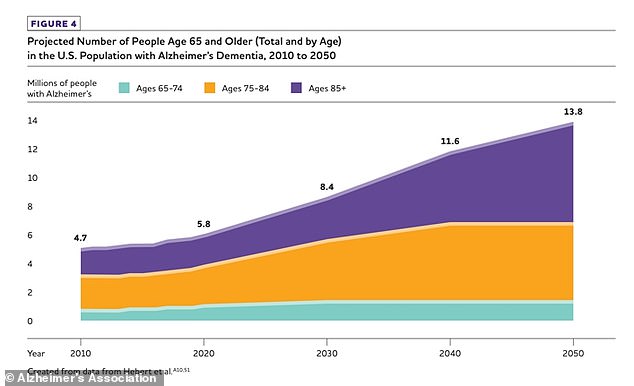Research suggests that the extent to which one's mind may decline with age could be estimated by examining the size of a diminutive muscle.
Doctors from Johns Hopkins measured the thickness of the temporalis muscle, which runs from the side of the head to the jaw joint, in more than 500 healthy adults.
Researchers observed 587 individuals with Alzheimer's disease over five years, monitoring them for any signs of cognitive decline, and discovered that those with weakened temporalis muscles in the front of their ears had a 60 percent higher risk of developing dementia.
As individuals grow older, they often experience a natural decrease in muscle volume, but those suffering from dementia typically lose muscle mass more rapidly than their counterparts without this degenerative condition.
As researchers like the Johns Hopkins group have started exploring, they want to know if muscle loss could potentially serve as a predictive indicator for dementia.
Typically, the disorder is diagnosed when it has reached an advanced stage at which time medical professionals' options for treatment are limited.
Scientists are therefore seeking a cost-effective and straightforward method to diagnose someone before symptoms emerge. Their goal is to then initiate early fighting measures, which can include incorporating measures such as resistance training, exercise, and enhanced nutrition.
The researcher, Dr. Shadpour Demehri, stated, "These interventions may help prevent or slow the process of muscle loss, which may subsequently reduce the risk of cognitive decline and dementia."


- reaching 12million people.
Methods to spot the condition early are necessary, so people can promptly act to mitigate some of the symptoms associated with dementia.
Researchers have long been aware that individuals with this condition experience a rapid loss of muscle mass.
Research has indicated that the temporalis muscle can be a reliable indicator of how the body's other muscles will function.
This research paper, which summarized the meeting, has not been officially released in a scientific publication.
Researchers examined 621 individuals around the age of seventy who were in good health at the outset of the study.
For a period of five years on average, researchers used MRI machines to obtain detailed images of participants' bodily structures, including bones, muscles, and the circulatory system.
According to the photographs they had taken, they grouped people into two categories.
A total of 131 participants were in the group with significant muscle mass and 488 participants were in the group with less muscle mass.
They then monitored the subjects for the progression of dementia, tracking the amount of brain tissue loss and conducting regular cognitive evaluations.
Researchers discovered that people with a smaller temporalis muscle were 60% more likely to develop dementia, even after taking into account factors such as age.
Study author Dr. Kamyar Moradi, who specializes in radiology at Johns Hopkins, stated, "This is the first longitudinal study to demonstrate that skeletal muscle loss may contribute to the development of dementia."

More research is needed to determine if the temporalis muscle is a reliable indicator of a person's risk of developing dementia.
Dr. Wintermark stated: 'In this specific case, it is challenging to establish whether muscle loss is a genuine risk factor for dementia or an outcome of the mechanisms that contribute to dementia.'
Even so, he concurred with the study authors that striving to preserve muscle mass and cardiovascular health in older years will likely be beneficial in deferring the onset of dementia.
Working to maintain muscle mass is a sensible approach, agreed Wintermark.
While current research has not found an effective method to completely halt the progression of this potentially fatal disease through exercise or other interventions, early investigations have indicated that adopting lifestyle modifications can potentially minimize someone's risk and alleviate the symptoms of dementia.
Researchers at the University of Washington found in their initial studies that cardiovascular and strength training may contribute to making the brain more resilient as people age.
This, in turn, could potentially help slow down the progression of dementia, giving back valuable years of a normal life.
Dr. Wintermark stated: "Maintaining a healthy lifestyle through regular exercise benefits individuals in numerous ways, with one notable advantage being the preservation of muscle mass."
Read more